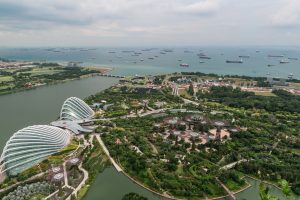Any study of history guarantees at least this conclusion: that the world order is in a constant state of flux, and that any attempt to ensure its immutability is destined for failure. We are driving down a long dark road, unable to see further than our headlights, trying to trace an image in the fog. Decision makers may find themselves intoxicated by illustrious ambitions and sucked into the promises of grand strategy which, as defined by historian John Lewis Gaddis, is the alignment of potentially unlimited aspirations with necessarily limited capabilities. Unable to predict the future, governments must work with what they have. No other country in Southeast Asia is more conscious of its limitations than the city-state of Singapore. A small island it may be, but its achievements and capabilities far outshine its size.
In his latest book “Singapore is Still Not an Island,” Bilahari Kausikan, a former Singaporean diplomat of 37 years, reminds us with clarity the uncertain future that lies ahead for his country and Asia in an age of great power competition and geopolitical uncertainties. Kausikan is a realist and sees the world, through his distinctively circular-rimmed glasses, with clear eyes and an appreciation of the cold reality of power. The book is a follow up of his 2017 publication “Singapore is Not an Island” and is a similar collection of articles and lectures covering a range of relevant topics, including expositions on Singapore’s core interests, the future of the Association of Southeast Asian Nations (ASEAN), and U.S.-China competition.
Kausikan rightly identifies a pervasive current in Singapore, and perhaps in the wider world too, that the number of people interested in foreign policy greatly outnumber those who understand it well. Social media has made its irreversible impact on our lives and its influences have distracted us from reality. We have become quick to moralize international developments, swift to disseminate unconfirmed reports, and even more eager to present opinions in the guise of expert analysis. Kausikan warns us that such an approach to foreign policy can be detrimental and paralyzing.
Given its strategic vulnerability, Kausikan argues, Singapore cannot get trapped into any binary worldview, such as the popular outlook that views strategic competition as a struggle of liberal democracy against authoritarianism. It also means Singapore does not and should not have to choose sides. As the only country with a majority Chinese population outside Greater China, Singapore cannot risk poor relations with Beijing; neither can it alienate Washington, given its irreplaceable role as a security guarantor in Southeast Asia. Recognizing one’s core interests is essential to making sensible foreign policy, but it is also the responsibility of governments to better explain their policy decisions to the public. Perhaps, it is on the latter point where governments are struggling now and why binary world views have become home remedies to their weaknesses in “retail diplomacy.”
As for ASEAN, Kausikan points out that it is facing significant pressures both internally and externally. The Myanmar military’s overthrow of the democratic government led by Aung San Suu Kyi in February 2021 has sparked a debate on how the Southeast Asian organization should deal with the Tatmadaw. “The West,” Kausikan argues, “approached Myanmar through a misplaced sense of moral superiority rather than strategic calculation.” ASEAN must keep pragmatism in mind, recognizing that the Myanmar military, though a problem, is an irreplaceable part of any solution to the conflict, and for governments to “muster political courage to be patient.”
Great power competition between the U.S. and China could also drag the regional organization away from the core principle of “ASEAN centrality.” Kausikan reminds us that Beijing has already made inroads on the Southeast Asian mainland with the construction of dams on the Mekong River and the growing dependence of Cambodia and Laos on Chinese largess and diplomatic support. ASEAN members must therefore recognize both their national and regional interests; only by keeping sight of them will the organization survive.
Repeating a point that he has made frequently in his commentaries and lectures, Kausikan argues that the U.S.-China rivalry does not constitute a new Cold War. He asserts that the Soviet Union and the U.S. functioned in separate systems – one socialist, the other capitalist – each hoping to replace the other. U.S.-China rivalry is different. Beijing and Washington operate in the same globalized and interdependent world, and both are actively interacting with one another. Arguably the source of today’s rivalry is Beijing’s wish to be recognized as an equal, something Washington is unwilling, or perhaps unable, to do. What Singapore, Southeast Asia, and the rest of the world should do to handle this rivalry, if the former envoy has not made it clear in his frequent public writings and commentaries, is to recognize and pursue one thing: their national interests.
On a rainy Thursday afternoon at the Nanyang Technological University Alumni Club, a large audience gathered in anticipation of the official launch of Kausikan’s book. After a series of speeches by veteran Singaporean politicians and diplomats, a member of the audience asked the panel where they stood, personally, if the U.S. and China rivalry escalated to war. Kausikan quickly answered: “We will always be on the side of Singapore.”
“Singapore is Still Not an Island” and its essays and speeches are not to be read chronologically. Rather, the book is an invaluable resource of reference for anyone who seeks to understand Singapore’s interests and how to look at Southeast Asia at a time of great geopolitical change. Kausikan reminds us of the immutable nature of power in international politics. Some may find this repetitive or even trite, but these are reminders we can ill afford to dismiss.

































